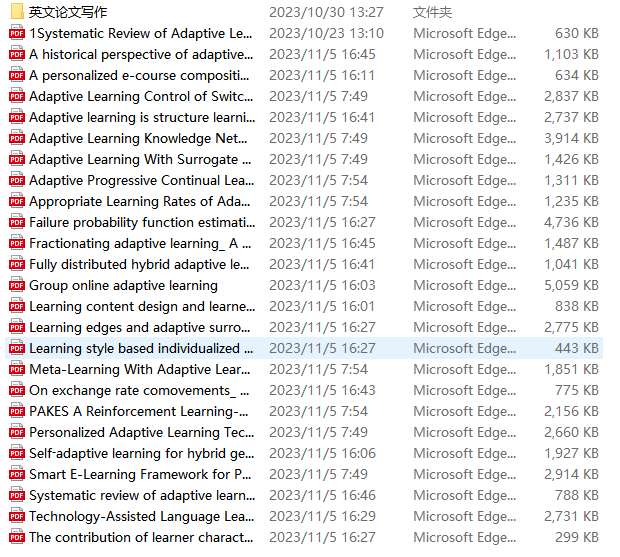-
曾佳尧
普通类 -
- 支持
- 批判
- 提问
- 解释
- 补充
- 删除
-
-
阅读笔记
-
综述选题
一、选题
人机协同背景下的教学模式研究
(选题缘由:当前在人机协同教学领域理论研究丰富,而具有操作性的教学模式较缺乏。一线教师实施过程中缺少参考样例,不能很好地开展人机协同教学,基于此,文章综述与此主题相关且具有代表性的人机协同教学模式,为一线教师开展人机协同教学实践提供参考)二、大纲
abstract
keywords
1.引言
文章研究背景(三个维度:人工智能技术推动支撑+国际政策引导+教育教学实践需求)
文章研究内容和目的(综述与”人机协同教学“相关的文章,筛选(规范)出优秀教学实践模式,为一线教师开展人机协同教学实践提供参考和建议)
2. 资料和方法
2.1研究主题界定
定义、界定综述关键词、说明综述范围(人工智能、人机协同、教学模式)
2.2研究设计过程、
采用的研究方法:文献研究法、内容分析法
阐述+可视化文章筛选过程( 确定综述目标和范围➔收集文献➔筛选文献➔记录分析➔组织整理)
2.3研究结论
撰写文献综述的结果:综述评价“模式”(找一个教学模式评价表)
3.讨论
对2.3部分做”述“,要有独立的思考和想法(针对模式提出建议/对模式进行整合+结合Chatgpt)
4.总结
总结文章内容、分析人机协同挑战-
选题修改
题目修改
Adaptive Learning and Human-AI Collaborative: A Systematic Review
人机协同背景下自适应学习发展现状研究
人机协同:human machine cooperation、human machine collaboration、hunman ai、Artificial Intelligence
指向内容:Adaptive Learning(Personalized education、self-regulated learning)
-
阅读笔记
-
选题完善
人机协同背景下自适应学习发展现状研究
-
引言
随着信息技术的不断发展,人机协同已经成为了当今社会的一个重要趋势。在教育领域,人机协同的应用也变得越来越广泛,其中自适应学习作为人机协同的一个重要方向备受关注。本文将在人机协同背景下,对自适应学习的发展现状进行深入研究和分析。 -
概念界定
2.1 人机协同
人机协同是指人类和计算机之间相互协作、共同完成任务的过程。在教育领域,人机协同旨在通过人工智能、大数据等技术,实现个性化学习、提高教育质量和学习效果。
2.2 自适应学习
自适应学习是一种根据学习者个体差异和需求,动态调整学习内容和难度的学习方式。它依托于人工智能、大数据等先进技术,通过对学习者学习行为和学习成绩的分析,为学习者提供个性化的学习方案。-
研究方法
本研究采用文献综述和案例分析相结合的方法,对自适应学习的发展现状进行深入分析和研究。首先,通过文献综述法收集和分析关于自适应学习的相关研究,了解其发展历程、实现方式、应用场景等。其次,结合案例分析法,对自适应学习在不同领域的应用情况进行深入剖析,总结其优势和存在的问题。 -
讨论
在人机协同背景下,自适应学习得到了广泛应用。通过对自适应学习的相关研究进行深入分析和总结,发现自适应学习在教育领域的应用现状。 -
结论
通过对自适应学习的研究现状进行深入分析和总结,能发现自适应学习在人机协同背景下的应用前景和优势以及存在的问题。
可以从以下几个方面展开:1)加强数据隐私和安全保护技术的研究和应用;2)制定统一的技术标准和规范;3)深入研究评估和验证方法;4)提高用户对自适应学习技术的接受度等。
展望未来,随着技术的不断进步和应用的深入推广,自适应学习将在人机协同背景下发挥更加重要的作用,为教育领域带来更多的创新和发展机会。
修改:
Human-AI assisted adaptive Learning in Higher Education: A Systematic Review
人机协同辅助下高等教育自适应学习发展现状研究
大纲:
abstract
keywords
1.Introduction
文章研究背景(两个维度:人工智能技术快速发展为自适应学习提供支撑+学者关注正式学习与非正式学习下的自适应学习发生)
文章研究内容和目的(综述与”高等教育下的自适应学习“相关的文章,发现这方面的综述较为缺乏,通过系统综述,为开展人机协同下的高等教育自适应学习研究提供参考和建议)2.Methods
2.1研究主题界定
定义、界定综述关键词(人工智能、人机协同、高等教育中的自适应学习)
2.2研究设计过程
采用的研究方法:文献研究法(参考以下文献筛选方法)系统综述设计过程(数据库、关键词、系统分析方法、文献筛选过程、汇总分析)

阐述+可视化文章筛选过程( 确定综述目标和范围➔收集文献➔筛选文献➔记录分析➔组织整理)
2.3研究结论
撰写文献综述的结果3.Discussion
对2.3部分做”述“,要有独立的思考和想法
4.Conclusion
总结文章内容、分析人机协同下的自适应学习挑战-
文献筛查:
到IEEE筛选到25篇文章,关键词(Human-AI、adaptive Learning、Higher Education、Systematic Review)

-
论文更新
Human-AI assisted adaptive Learning in Higher Education: A Systematic Review
abstract
keywords:Human-AI;adaptive Learning;Higher Education
1.Introduction
With the continuous development of technology, the application of Artificial Intelligence (AI) in higher education has become an important direction of educational innovation. AI-assisted learning systems are able to adjust the content and difficulty of learning according to the students' learning situation, thus providing a personalized learning experience. This kind of adaptive learning helps to improve students' learning effectiveness and learning experience. However, how to effectively apply AI-assisted learning systems and how to assess their impact on students' learning are still issues that we need to explore. Therefore, the aim of this paper is to delve into the application of AI-assisted adaptive learning in higher education and its impact through a systematic review of related literature.
In the following article, we will first explore the conceptual and theoretical foundations of AI-assisted adaptive learning. Then, we will review and analyze the literature on the design and implementation of AI-assisted adaptive learning systems. Then, we will explore the impact of AI-assisted adaptive learning on student learning in terms of students' learning outcomes, learning experiences, learning satisfaction, and learning behaviors. Finally, we will summarize and discuss the limitations of existing research and directions for future research to inform the further development of AI-assisted adaptive learning in higher education.2.Human-AI assisting in Higher Education
3.adaptive Learning with the emergence of Human-AI
4.Research methodology
Recent research has made the role of human-machine cooperation very prominent for adaptive learning in higher education. A more adaptive learning powered by human and ai is being massively discoursed. To evaluate where the literature stands on adaptive learning、and AI asisting in the current context, this study explores:
a. The recent status of research on adaptive learning in higher education
b. The main areas where human-AI has been incorporated for adaptive learning
c. The present limitations in the field of human-AI assisted adaptive learning
4.1. Systematic reviewThis study follows a Systematic Review (SR) methodology that involves search, collation, and appraisal of relevant mainstream and supplementary human machine cooperation and adaptive learning literature for the higher education. database - IEEE Xplore is used for this purpose with a time-reference period of 2 years (2020–2022).
4.2. Search process and data extraction
i. The first stage was to formulate the review questions and a review title
ii. The second stage was to define exclusion and inclusion criteria. Such criteria that we used in this study are mentioned below:
Inclusion Criteria (IC):
⁃ Papers published in listed academic journals including conference papers
⁃ Papers that were mainly focused on adaptive Learning in higher education and Human-AI assisting
⁃ Papers talking about various assistance of AI and adaptive learning in higher education
⁃ Papers mentioning challenges of adaptive learning in the education
4.3 results
5.Discussion
6.Conclusion -
-
- 标签:
-
加入的知识群:

.jpg)

学习元评论 (0条)
聪明如你,不妨在这 发表你的看法与心得 ~